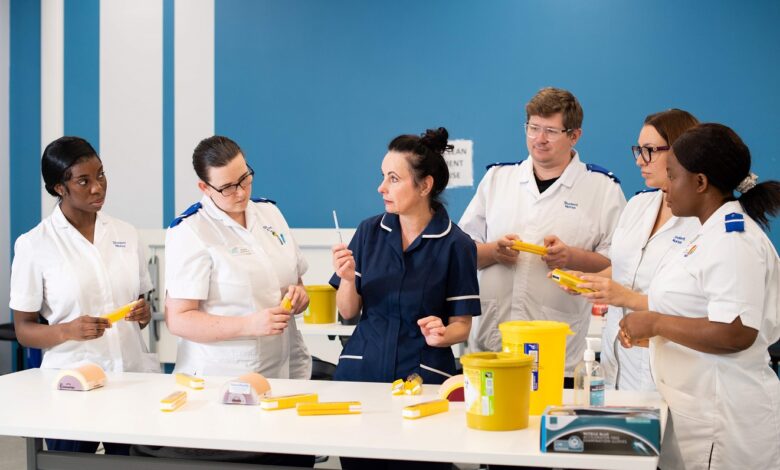First UK university to train all student nurses to use drug overdose kits

All student nurses at a university in Yorkshire are to receive training on how to use naloxone, the life-saving medication that can reverse overdoses caused by opiates.
The initiative, to be introduced by the University of Bradford, is thought to be the first of its kind to be implemented in the country.
“We are, as far as we know, the first university in the UK to train all our student nurses in how to administer naloxone”
Natalie Finch
The training, which will be given to around 400 students every year, will be delivered in partnership with New Vision Bradford, which is commissioned to deliver drug and alcohol treatment in the area.
It comes at a time when the UK illegal drug market is undergoing massive change, with heroin being replaced by a range of much stronger and more dangerous synthetic opiods, noted the university.
Dr Natalie Finch, an assistant professor and registered mental health nurse experienced in working with people who use opiates, said teaching students how to use the kits was a first for the university.
She said: “Naloxone has been available in the UK for individuals to carry for around 10 years.
“Whilst nurse education requires students to know how to respond to emergencies such as someone’s heart stopping, choking, or serious allergic reaction, there is currently no national requirement for nurses to know how to respond to an overdose.
“We think this is wrong,” she said. “We are, as far as we know, the first university in the UK to train all our student nurses in how to administer naloxone.
Dr Finch described the initiative as being “about harm reduction”, of which she said one element was the question of how to stop people dying of preventable overdoses.
“One of the things we can do is train people to use naloxone kits, which when administered immediately temporarily reverse the effects of an opioid overdose, which buys valuable time for the emergency services to attend.”
She added: “Naloxone kits are simple to use and widely available and can make a huge difference on the rate of deaths by overdose, which has been growing year on year for some time.”

First year BSc adult nursing students being taught how to use naloxone kits by Amanda Briggs
Colleague Dr Amanda Briggs, registered nurse and assistant professor, said: “We are intent on preparing our students to be the best they can be.
“This training gives our nursing students skills they would not otherwise receive, and a skill which could potentially save someone’s life,” she said.
Jon Findlay, national harm reduction lead for Humankind, the charity that leads the New Vision Bradford partnership, said: “This is the first time we have done mass training of this sort.
“It has been very useful, both in terms of delivering the training and also being able to address the stigma around drug use,” he said.
“Naloxone is an amazing medicine and I believe it should be in every first aid kit and alongside every defibrillator in the country.
“This is ultimately about reducing deaths from drug overdoses,” he said. “Some have argued it might encourage drug use but there is no evidence for that.”
Naloxone is a medicine that rapidly reverses an opioid overdose. It attaches to opioid receptors in the brain and reverses and blocks the effects of other opioids.
It was first developed in the early 1960s and began to be more widely used in the 1970s. In the UK, naloxone is a prescription only medicine regulated by the Human Medicines Regulations 2012.
In January, the Department of Health and Social Care published a review that recommended relaxing the rules on the use of naloxone, to make it easier for treatment centres to access and administer it.

Natalie Finch, Jon Findlay and Amanda Briggs






